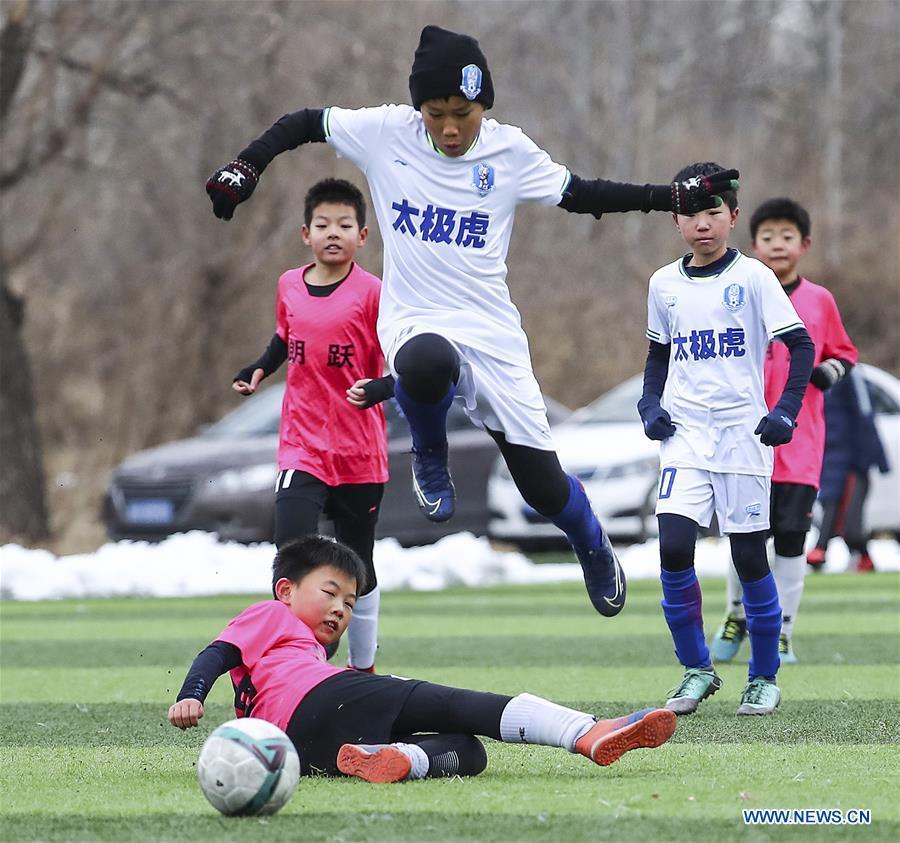
 0 Comment(s)
0 Comment(s) Print
Print E-mail China Daily, March 28, 2024
E-mail China Daily, March 28, 2024
Chinese soccer is looking to the future with a renewed focus on youth development following the publication of new government white paper on the game.

Du Yiming (top) of Tiger Club's U10 team breaks through during the match against Langyue Club's U10 team at 2019-2020 Beijing Youth Football Club League in Beijing, capital of China, on Jan. 11, 2020. (Xinhua/Zhang Yuwei)
A total of 12 government departments, including the General Administration of Sport of China, the Ministry of Education, the Ministry of Finance and the Chinese Football Association, jointly issued the "Implementation Guidelines on the Reform and Development of Chinese Youth Soccer" on Monday, reaffirming the nation's determination to solve some of the issues which have blighted Chinese soccer for decades.
The primary aim of the guidelines is to establish a new development channel for youth players by 2025, and set up a talent training system that integrates sports and education. In addition, the plan outlines how the Chinese Youth Football League will become the top youth soccer tournament in China with the widest coverage, the largest number of participants, the highest level of competition, and the greatest social influence.
By 2030, it is expected that the number of young people playing the game will have increased significantly, with a better structure for youth soccer competitions and training in place. It is also hoped that the national youth teams, for boys and girls, will be among the top squads in Asia by that time. By 2035, the plan envisages that those youth squads should be achieving excellent results on the international stage, and providing strong support for the comprehensive development of Chinese soccer.
To achieve these goals, the guidelines propose comprehensive measures to level up Chinese youth soccer. They include the promotion of youth soccer, and creating a healthy environment in which soccer culture can flourish, especially among the younger generation.
Delving deeper into the details of how all this might work, the guidelines suggest more schools should add soccer to their PE classes, and organize more soccer activities on campus, even outside of regular school hours. The establishment of more soccer clubs within schools is also encouraged. Furthermore, soccer-related books, comics, games and movies can be used to promote soccer culture.
The measures stress the importance of creating a better talent nurturing system. This can be achieved by improving soccer education in schools, strengthening youth teams in sports schools and professional clubs, and ultimately building stronger national youth teams — from players to coaching and support staff.
At local level, the white paper proposes the designation of 18 "soccer-focused cities", which would be selected based on the popularity level and tradition of soccer in these areas.
Meanwhile, the guidelines encourage all levels of youth clubs and organizations to send their young players to train and compete with foreign teams, especially in high-level tournaments. Campus soccer exchange programs will also be promoted, with soccer coaches and referees sent to train and develop in countries that are renowned as powerhouses of the sport.
The General Administration of Sport of China (GASC) hosted a news conference on Monday to explain how the new guidelines will be effectively implemented.
"The next step is for the GASC to work closely with other departments and local governments. With the guidance of the government and the support of society, there will be more investment in the sector. We will also increase our support to soccer associations of all levels and increase our support of soccer youth training," read a GASC announcement after the news conference.
"We will fully implement the guidelines, and we will build an assessment system. We will build a better environment for youth soccer development, and we facilitate the healthy growth of the sport among the younger generation."
China has had a problem in retaining young talents in the game as they enter their teenage years, due to the pressures of balancing training with academic studies.
Addressing these concerns at the news conference, the GASC statement read: "We should focus on students' different needs at the various stages of youth training. We should continue to provide a quality environment for soccer youth training and academic studies. For those promising talents, we need to establish channels for them to continue their studies.
"We will establish special soccer classes in middle schools in certain areas. And for students who are selected into the first-tier youth teams of professional clubs, they will be able to retain their student status in their original school or university. From primary school to university, the admission process for youth soccer players should be more streamlined with better services."
Chinese soccer has been struggling at both international and domestic level for years. Building a better youth training system is considered the most effective and fundamental solution to many of the sector's issues.
The newly published white paper has been welcomed by fans, media and pundits, who hope it could be a turning point for Chinese soccer.
"The new guidelines call for the promotion of youth soccer, integrating soccer into PE classes and trying to solve the problem of young players quitting the game prematurely. These measures are welcomed by fans and allow us to envisage a potentially promising future," read a commentary by thepaper.cn.
"Chinese soccer does not lack participation numbers or investment. As long as everyone in the sector contributes, then Chinese soccer will be successful and make significant progress."
Go to Forum >>0 Comment(s)